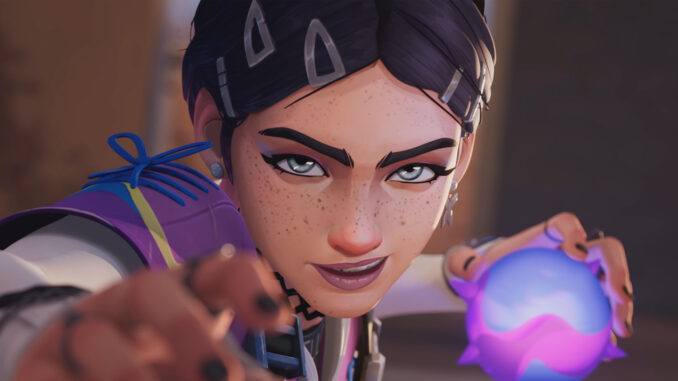
By Eden Lawrence
First-person-shooter video games “Valorant” and “Overwatch 2,” have achieved a “first” in their respective games: both have introduced a non-binary character in their roster. Valorant has introduced Clove, and Overwatch 2 has given us Venture. Both characters canonically use they/them pronouns, and this is a big step for representation in video games. There’s been an increase of Queer characters in video games, and I hope to see this trend continue.
As a Queer gamer myself, I love seeing more companies introduce characters that are part of the LGBT+ community. One of my favorite games to play is “Apex Legends,” as Queer representation has been present within the game since its debut in early 2019. One of its characters, Bloodhound, identifies as nonbinary. Another character named Gibraltar is a gay man. Both of these characters’ identities play a massive role in their lore.
Bloodhound was raised by their uncle who taught them to embrace and learn from nature. They were separated from the public and didn’t live a life framed by societal norms, so Bloodhound going by they/them is natural. On the other hand, Gibraltar was stuck in a mudslide with his then-boyfriend, Nick, when his father saved them both from peril. This event led to Gibraltar valuing life more and wanting to dedicate himself to helping others. It also showed that Gibraltar’s father was accepting of his son being gay, risking his life for them both.
Not only are these characters’ Queerness brought up in a natural light, but they also evolve. Bloodhound forms a romantic relationship with a pansexual character, Fuse, which was made official in Oct. 2022. Gibraltar and Nick are later seen having more conversations, patching up the relationship. This, however, isn’t all.
In Oct. 2022, Respawn Entertainment, the video game company in charge of “Apex Legends,” released a new character, Catalyst, which was Apex’s first-ever transgender character. Catalyst, a male-to-female transgender woman, was another character that broke the boundaries of gaming. Respawn even hired a transgender woman, Meli Grant, as the voice actress. There wasn’t a lot of transgender representation in gaming, so it was nice to see developers make an effort to connect with these communities. Seeing how well they made a transgender character in terms of design and story leaves me wondering how more Queer characters will be presented in the future.
While this is the first time Valorant and Overwatch 2 have given us nonbinary characters, this isn’t their first instance of acknowledging the Queer community.
In Dec. 2022, the Valorant Twitter page posted a photo confirming the lesbian relationship of their two characters, Raze and Killjoy. However, this remains Valorant’s only Queer couple. With the introduction of Clove, I hope to see Riot Games, Valorant’s game developer, find more ways to represent the community. With Raze and Killjoy in a lesbian relationship and Clove as a more feminine representation, I hope to see the inclusion of a Queer man in the future.
Queer representation in Overwatch 2 can date back to 2016 with the character Tracer. Tracer has been an iconic character in Overwatch with many considering her the poster child of the game, which makes her confirmation of being a lesbian even more important for the Queer community.
Soldier 76, another iconic character, was confirmed to be gay in early 2019 in a short story titled “Bastet.” This story saw Soldier 76 talking about a former lover, Vincent, who was now married with children. Soldier 76 is another contender for Overwatch’s poster child, shedding light on a community that has been overlooked for years.
Additionally, two other characters were confirmed to be Queer in 2023. In late May of last year, Blizzard Entertainment, developers of Overwatch 2, released another short story titled, “As You Are,” featuring characters Pharah and Baptiste. In this narrative, Pharah comes out to Baptiste as a lesbian. What I love about this moment is how Pharah didn’t dance around the subject. She casually brought it up in the conversation, which sticks out to Baptiste. This leads to him nonverbally coming out as bisexual. The story is even bordered with pink, purple, and blue: the colors of the bisexual flag.
With the inclusion of all these queer characters, hate and homophobia is bound to follow, and this sadly comes in many forms. Many people try to boycott the game, saying developers are making it “too woke.” They claim that developers are only including Queer characters to appease liberal gamers, while others purposely use incorrect pronouns for certain characters. They will use she/her for Clove, and even refer to Catalyst as a man. Their hate extends further, as some will go out of their way to harass other gamers for simply choosing to play as Queer characters.
I believe the best way to drive out this hate is for the developers to make it known that homophobia isn’t something they want to harbor in their community. Respawn Entertainment, Riot Games, and Blizzard Entertainment have made their stance known.
Apex Legends, Valorant, and Overwatch 2 gave their communities LGBT+ banners and badges to use on their profiles. These cosmetic items were free of charge, allowing Queer gamers to show their pride.
The environment of gaming is usually seen as toxic and unwelcoming to people who aren’t cis-gender, white males. Developers aim to change this by implementing more diversity within their games. Gaming should be for everyone, and I can’t wait to see who they introduce next.
